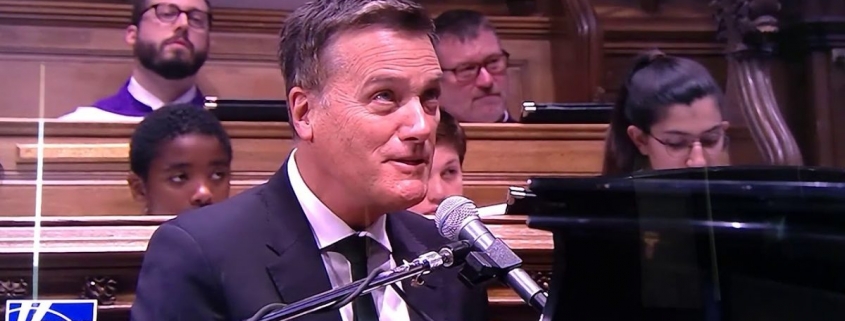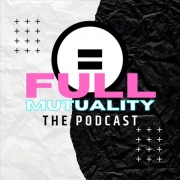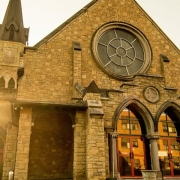How Michael W. Smith, George W. Bush and one popular worship song expose the problem of Calvinist theology and politics
This article originally appeared on October 11, 2022 at Baptist News Global.
There is a reason why one of the most influential worship songs of the past quarter century expresses a truth that could turn evangelicalism upside down and yet has been repeatedly rejected and banned by conservative evangelical complementarian Calvinists.
Growing up in an independent Baptist world where contemporary worship music was categorically condemned, I was a 19-year-old worship leader who would sneak away to the Family Christian Bookstore in the local mall so I could put on the store’s headphones and listen to Paul Baloche and Lenny LeBlanc’s song, “Above All.” Its beautiful simplicity spoke to my soul at a depth that the piano- and organ-led hymns we sang at church simply didn’t reach at the time.
When Michael W. Smith sang the song at a Franklin Graham crusade in Spartanburg, S.C., in 2001, I risked getting expelled from Bob Jones University by attending so I could hear it in person.
While my conscience felt conflicted for listening to contemporary worship music behind the backs of my parents and Christian school, my heart longed for the day when I could lead a congregation of worshipers in “Above All.” Then the summer after my sophomore year at Bob Jones University, I landed my dream job leading worship at an evangelical summer camp.
But during the second week of camp, the camp director pulled me aside and said he wasn’t going to allow me to select “Above All” for any of our worship sets that week because a Calvinist church was going to attend that thought it was theologically wrong. And because I soon became a Calvinist, for the next 18 years, I never was able to lead it in any church I was a member of.
Birthed in the quiet of an empty church
I was relegated to singing “Above All” in secret with the privacy of my piano. But in a sense, my experience with the song in solitude fit well with the song’s origin.

Paul Baloche
“Above All” was birthed in the quietness of an empty church as Paul Baloche sat down at his piano and began to play while reflecting on how great God is. When he shared what he was writing with Lenny LeBlanc, the two of them worked together to finish the song.
“Above All” became one of Baloche’s most influential worship songs, alongside such songs as “Open the Eyes of My Heart,” “Hosanna,” and “Your Name.” It received a nomination for Song of the Year at the Dove Awards in 2002 and 2003.
But neither Baloche nor LeBlanc had any idea the extent to which the song would rise to reach the most powerful men in the world.
Michael W. Smith sings truth to power
At the dawn of the George W. Bush presidency, evangelicals were poised to position themselves as close as they could to the Methodist president who claimed to be born again. But while powerful pastors were flocking to influence public policy, an evangelical musician and worship leader named Michael W. Smith had another message.
With the world’s most powerful people sitting quietly at the 2001 inaugural prayer service, Michael W. Smith sang:
Above all powers, above all kings
Above all nature and all created things
Above all wisdom and all the ways of man
You were here before the world began.
Before the very man who held the authority to begin the longest war the United States had ever waged, Smith was reminding everyone that there was a reality and a power far more ancient and beyond him.
Smith told CCM Magazine at the time about when he first heard the song: “I’ll never forget going, ‘That’s what I’m singing in Washington.’ … I even had cheat sheets on the piano because I had never sung it live before. I had not memorized it. So I had to pull these things out of my pocket and lay them on the piano. Very unprofessional. But I was determined to sing it.”

George W. Bush (R) waves after singer Michael W. Smith (L) performed during an event on the South Lawn of the White House September 8, 2008, in Washington DC. President Bush honored volunteers who serve at home and abroad and called on Americans to volunteer four thousand hours in their lifetime. (Photo by Mark Wilson/Getty Images)
Apparently President Bush loved the song, because he would go on to ask Smith to sing it regularly.
When Baloche heard about Smith singing his song for the president, he told CCM Magazine: “I’m humbled and blown away that a simple prayer of worship, started at my little piano, found its way to the president of the United States. The possibility that this song could be an encouragement to him is such an honor.”
Conservative evangelical complementarian Calvinist men respond
But one group of pastors in particular were not that high on the song.
Bob Kauflin is one of the most influential worship pastors of the past couple decades. In addition to working with CJ Mahaney in Sovereign Grace churches, Kauflin started Sovereign Grace Music 35 years ago, which has become perhaps the most influential producer of worship songs for conservative evangelical, complementarian Calvinist churches. He also led worship for the Together for the Gospel conferences that influenced pastors and congregations worldwide.










Leave a Reply
Want to join the discussion?Feel free to contribute!